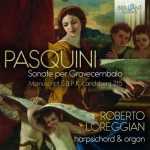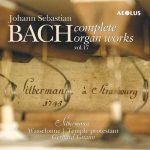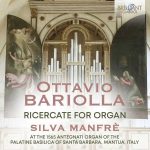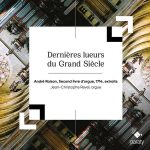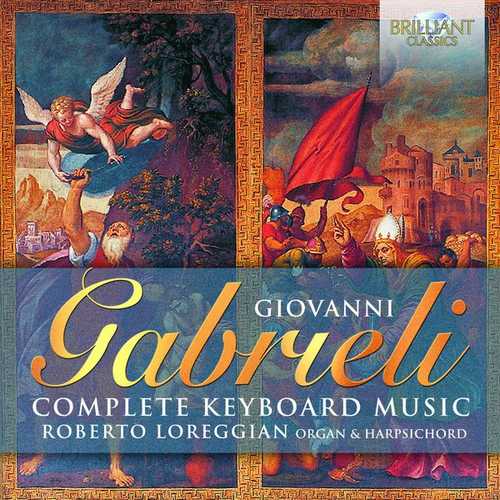
Composer: Giovanni Gabrieli
Performer: Roberto Loreggian
Format: FLAC (tracks)
Label: Brilliant
Release: 2017
Size: 3.44 GB
Recovery: +3%
Scan: cover
01. Toccata primi toni, C.D10
02. Intonazione del ottavo tono, C.246 – Ricercar ottavo tono, C.215
03. Canzon francese, C.232 0:
04. Intonazione del terzo e quarto toni, C.242 – Fantasia quarti toni, C.227
05. Toccata, C.D11
06. Ricercar, C.223
07. Canzon III, C.188
08. Canzon, C.231
09. Toccata, C.237
10. Canzon, C.234
11. Intonazione del secondo tono, C.241 – Ricercar, C.221
12. Canzon I “la spiritata”, C.186
13. Intonazione del quinto tono, C.243 – Ricercar, C.222
14. Toccata, C.D12
15. Intonazione del primo tono, C.240 – Ricercar, C.217
16. Intonazione del duodecimo tono, C.250 – Canzon IV, C.189
17. Intonazione del nono tono, C.247 – Ricercar, C.218
18. Toccata, C.D14
19. Toccata, C.238
20. Canzon II, C.187
21. Intonazione del sesto tono, C.244 – Fantasia sexti toni, C.S3
22. 4 Toccata del secondo tono C.236
23. Fuga, C.228
24. Intonazione del undecimo tono, C.249 – Canzon, C.230
25. Intonazione del decimo tono, C.248 – Ricercar decimo tono, C.216
26. Canzon, C.235
27. Toccata primi toni, C.239
28. Fuga noni toni, C.S5
29. Fantasia in modo di canzon francese, C.194
30. Toccata, C.D16
31. Canzon, C.218
32. Intonazione del settimo tono, C.245 – Ricercar septimi et octavi toni, C.S4
33. Toccata quinti toni, C.S2
34. Fuga, C.229
35. Ricercar, C.219
36. Toccata, C.D13
37. Ricercar primi toni, C.251
38. Canzon, C.233
39. Ricercar, C.220
40. Ricercar, C.225
41. Toccata, C.D15
42. Jubilate deo omnis terra, C.16
43. Cantate domino, C.6
44. O doctor optime, C.139
45. O sacrum convivium, C.S16
46. Angelicos cives, C.S15
47. Congratulamini mihi, C.54
48. Sancta et immaculata virginitas, C.55
49. Labra amorose e care, C.90
50. Exaudi domine justitia meam, C.7
51. Domine deus meus, C.127
52. Alleluja, quando jam emersit, C.C1
53. Exultavit cor meum, C.53
Recorded: October 2014
Recording Venue: Duomo di Valvasone, Italy
Having received his first exposure to music through his uncle Andrea Gabrieli, Giovanni Gabrieli grew up in the creative atmosphere of Venice’s San Maurizio district and within the walls of St Mark’s Basilica, where he would become organist in January 1585. In the years in which Giovanni was active, the churches of Venice bore witness to the emancipation of instrumental music from vocal music. At St Mark’s, music for the organ appeared alongside liturgical choral music, independent from the latter and comprising motets and instrumental pieces. Indeed, in Gabrieli’s Venice a distinction was being made between virtuoso organ soloists and choral accompanists.
His works for keyboard, whilst relatively scarce in his catalogue, embrace all of the main genres in fashion between the late 16th and early 18th centuries. This recording presents the entire body of work, and was put together predominantly on the basis of the manuscripts held by the Foà and Giordano collections in Turin. Following the removal of numerous works and the discovery of new manuscripts, the recent Charteris (C.) catalogue comprises four toccate, 16 ricercari and six canzoni da sonar. These are joined by the 11 Intonationi d’organo designed originally as introductions to vocal works or other instrumental compositions.
Performing these works is noted musician Roberto Loreggian, who released the 6‐CD set of the Complete Keyboard Music of Giovanni Gabrieli’s uncle, Andrea, on Brilliant Classics in 2015 to great critical acclaim (BC94432). He has collaborated on several other recordings for Brilliant Classics including the C.P.E. Bach Edition (BC94960) alongside Federico Guglielmo, praised by Gramophone for its ‘fine style and spirit’, and the Frescobaldi Complete Edition (BC94111), which earned him the 2009 ‘National Classical Music Track Award’.
To faithfully recreate the early‐17th‐century sounds Gabrieli himself would have heard, Roberto Loreggian returns to the historic 1532 Vincenzo Colombi organ at the Valvasone cathedral in northeast Italy, the same instrument he used for his Andrea Gabrieli set and the only 16th‐century Venetian organ still in existence. The harpsichord on the recording also dates from the 17th century.
